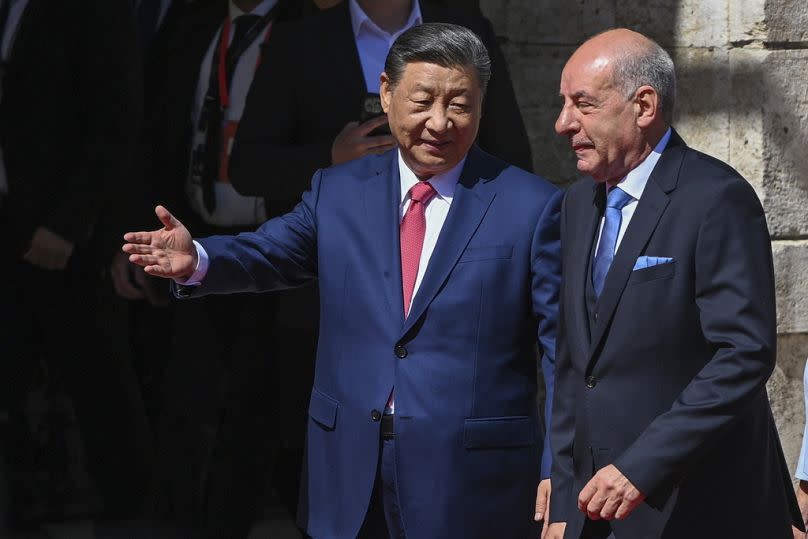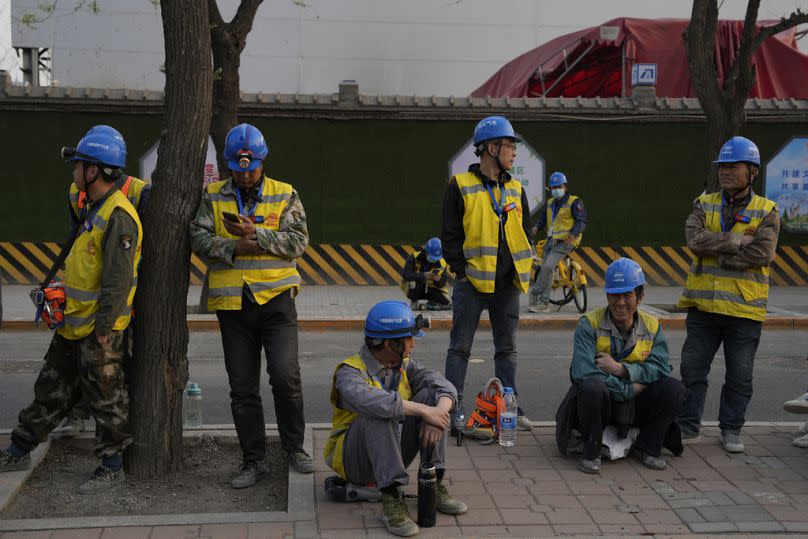Xi's European tour: Some euro, no vision

Xi Jinping arrived in Europe earlier this week lugging some heavy economic baggage.
With foreign direct investment into China plunging 82% to just $33 billion (€30.5bn) in 2023 — a three-decade low — one might have expected Xi's tour to be a full-fledged charm offensive aimed at wooing back skittish European investors and businesses.
However, the authoritarian leader's trip was anything but charming.
Rather than candidly address the headwinds battering China's economy and appease anxious trading partners, Xi doubled down on the same tone deaf tactics that have defined his authoritarian rule for over a decade.
Cosying up to the like-minded regimes in Hungary and Serbia, Xi offered limited compromises on China's aggressive trade practices. This hardline posture underscores Xi's fundamental inability to relate to major market economies as an equal partner respecting fair competition.
For China, the results have been disastrous. The fact that the US has now surpassed China as Germany's largest trading partner lays bare the costs of Xi's inflexible approach.
Germany has been one of China’s more reliable European partners — this shift, however, shows the extent of Europe’s growing rejection of China's hegemonic ambitions.
A bad call at a bad time
With a looming demographic crisis at home and a faltering real estate sector, China needs its top export markets — the US and Europe — more than ever. But authoritarians don't make a habit of offering concessions or leading with a spirit of compromise.
Xi had a prime opportunity on this European tour to chart a new course, one oriented around economic liberalisation, market reforms, supply chain transparency, and fair competition.

Instead, he chose the path of confrontation towards vital European trading partners while cosying up to Europe’s authoritarian eastern flank.
This represents an untimely miscalculation. By ignoring the reasonable concerns of Europe's leading economies, Xi has squandered an opportunity to help stave off potential economic implosion at home.
Foreign capital will continue fleeing, spooked investors won't return, and European markets will become increasingly inaccessible so long as Beijing maintains its predatory trade practices.
Respect the rules of the market you need
The reality is that while China’s domestic market remains important, the number of foreign firms deriving profits there appears to be shrinking.
According to a report from the McKinsey Global Institute, multinational corporations’ “share of all revenues earned in China declined from 16% to 10% from 2006 to 2020.”
For many, the Chinese market has become an empty promise. The European Union Chamber of Commerce in China's latest survey shows record-low business confidence in the Chinese market.

In fact, a record share of respondents doubted their profitability in China. In the US, as well, less than half of companies responding to an American Chamber of Commerce in China survey indicated they expect to be profitable in 2024.
Xi had an opportunity to change the tides with respect to investment in China. He could have addressed the pressing needs of his European trading partners with humility and opened the door to renewed economic cooperation.
EU ready to make 'full use' of trade defence tools against China, von der Leyen warns Xi
China's Belt and Road Initiative is bringing new risks to Europe
Unfortunately for the Chinese people, returning to robust commerce with Europe and North America's major economies would require the flexibility and respect for market principles that Xi's authoritarian mindset renders him incapable of delivering.
With foreign capital fleeing, property values falling, youth unemployment surging, and indebtedness soaring, China is in desperate need of a win for its export-driven economy.
The status quo won't fly any more
On this trip, European Commission President Ursula von der Leyen bluntly conveyed the EU’s demands for fair economic competition with China and its willingness to robustly defend its interests against Beijing’s unfair trade practices.
In response, Xi bluntly denied the basis for Europe’s concerns, claiming, “The so-called ‘problem of China’s overcapacity’ does not exist, either from the perspective of comparative advantage or in light of global demand.”
This builds on the ES's 2019 designation of China as a "systemic rival" and should be understood in China for what it is: a clear warning that the status quo is no longer acceptable.
By doubling down on authoritarian belligerence, Xi demonstrated a lack of vision for productive European engagement.
For China to revive its fortunes, it must fundamentally change course, abandoning its version of predatory state capitalism in favour of the genuine market reforms its trade partners worldwide are calling for.
By ignoring Europe's call for change, Xi has ensured darker economic days ahead for the Chinese people.
Elaine Dezenski is senior director and head of the Center on Economic and Financial Power at the Foundation for Defense of Democracies, a non-partisan think tank based in Washington, DC.
At Euronews, we believe all views matter. Contact us at view@euronews.com to send pitches or submissions and be part of the conversation.

